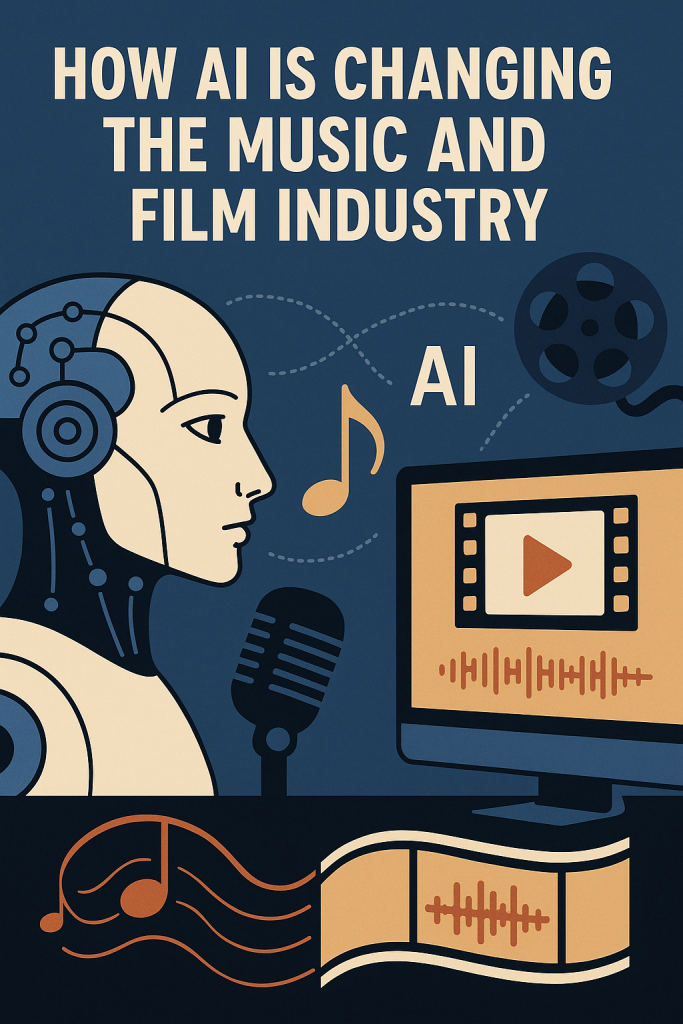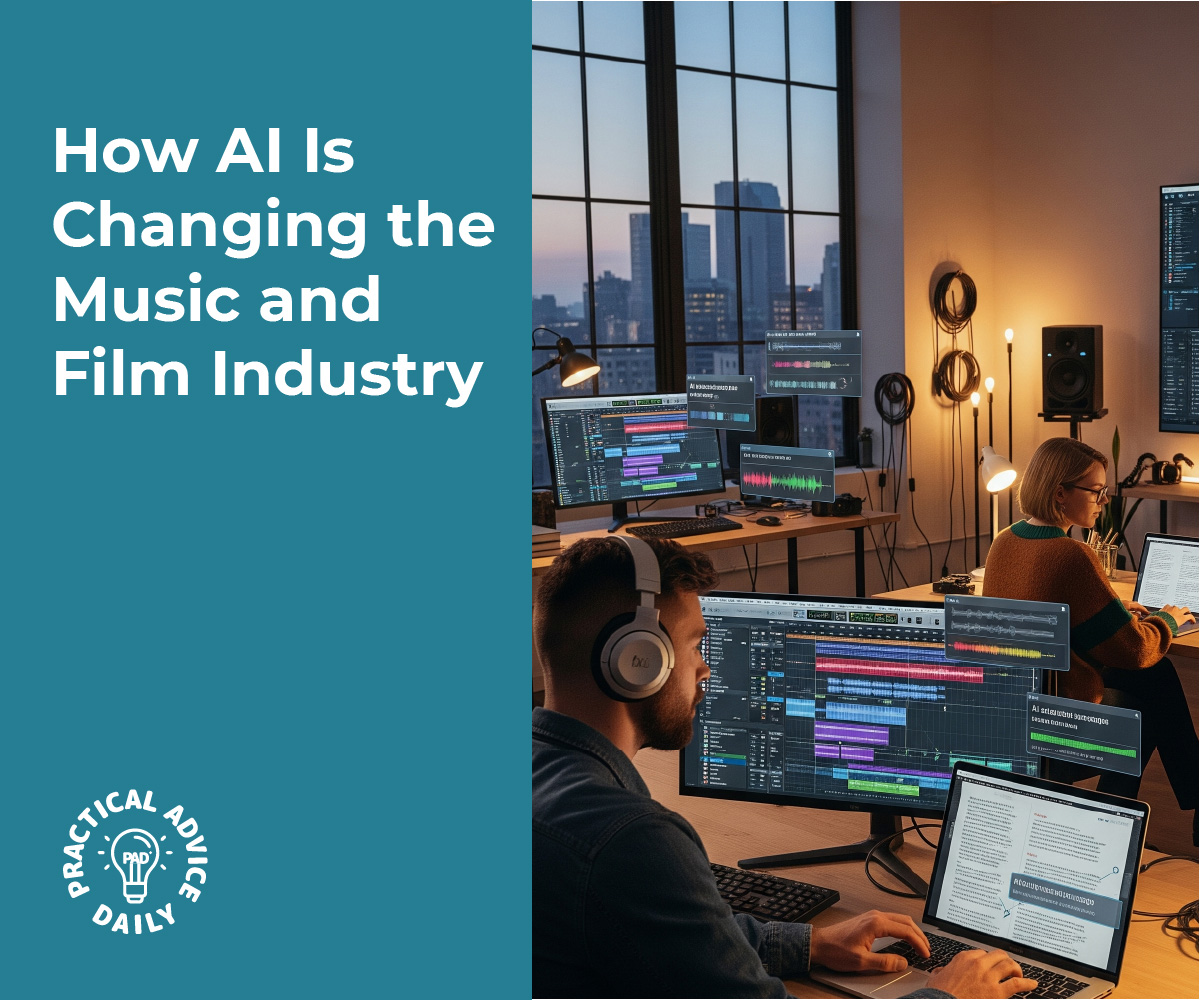The world of music and film has always embraced new technology, from microphones and sound mixers to digital cameras and editing software. Today, a new tool is making its mark: artificial intelligence (AI). AI can now write songs, suggest scripts, and even edit videos with surprising skill.
For many people, this sounds exciting, while for others it feels a little unsettling. Will computers replace human creativity, or will they simply give artists new ways to express themselves? In this guide, we’ll explore how AI is being used in music and film, the opportunities it brings, and the controversies it raises. Don’t worry if you’re not tech-savvy—everything will be explained in simple, everyday language.
Table of Contents
Key Takeaways
- AI can generate music, write scripts, and edit videos, saving time and inspiring new ideas.
- Musicians and filmmakers are using AI as a partner, not a replacement, for creativity.
- AI raises concerns about copyright, originality, and the future of human jobs in the arts.
- Like past inventions, AI is reshaping the industry but still relies on people to guide it.
How AI Creates Music
Imagine typing a few words like “soft piano music for relaxation” into a computer and getting a full song in minutes. That’s exactly what AI tools like Amper Music and AIVA can do.
How it works in simple terms:
- AI studies thousands of existing songs.
- It learns patterns, such as what chords usually follow each other or how different instruments sound together.
- When asked, it combines these patterns to create brand-new music.
Opportunities:
- Independent artists can quickly create background music for YouTube videos or podcasts.
- Songwriters can use AI to overcome “writer’s block” by generating melodies to spark ideas.
- Small businesses can get affordable custom music instead of paying for expensive licensing.
Controversies:
- Some worry AI music could flood the market, making it harder for human musicians to earn a living.
- There are copyright concerns. If AI learned from existing songs, who owns the rights to the new piece?
- Listeners may wonder: is a song as meaningful if no human emotion went into writing it?
AI in Scriptwriting
AI can also write scripts. Tools like ChatGPT or Sudowrite can create story outlines, suggest dialogue, or even draft entire scenes.
How it works:
- AI reads countless scripts, books, and stories.
- It learns how stories are structured: beginning, conflict, climax, and resolution.
- It then creates new text based on prompts like “a romantic comedy set in New York.”
Opportunities:
- Screenwriters can use AI to brainstorm faster and test different story ideas.
- Beginners can practice writing by collaborating with AI suggestions.
- Studios can save time by letting AI create rough drafts before humans polish them.
Controversies:
- Writers fear being replaced, especially in a cost-cutting industry.
- AI sometimes reuses clichés or patterns it has seen before, raising questions about originality.
- If an AI script resembles an existing work too closely, who is responsible for plagiarism?
During the 2023 Hollywood writers’ strike, one of the key debates was how much studios should be allowed to use AI in scriptwriting. This shows how deeply the issue affects real people’s livelihoods.
AI in Video Editing
Editing video has always been a time-consuming process. AI now makes it faster by automatically cutting clips, adjusting lighting, and even generating special effects.
Examples in real life:
- AI can spot when someone is speaking in a video and cut directly to that clip.
- It can add subtitles instantly by recognizing speech.
- Some tools can even remove background noise or change the sky in a scene from cloudy to sunny.
Opportunities:
- Small creators can produce professional-looking videos without expensive equipment.
- Filmmakers can spend more time on creative choices instead of tedious edits.
- Newsrooms and social media teams can quickly prepare content for fast-moving events.
Controversies:
- Editors worry about losing jobs if AI handles the bulk of routine tasks.
- Some argue that too much automation could make films feel less personal.
- There are ethical debates about “deepfake” technology, which uses AI to alter faces or voices in videos.
Looking Back to Look Forward
It helps to remember that every new technology has sparked worry. When photography was invented, painters feared no one would value portraits anymore. When synthesizers came along, musicians worried they would replace real instruments. Instead, these tools became part of the creative toolbox.
AI may be following the same path. It is not replacing creativity but changing how it looks. Musicians, writers, and filmmakers who use AI as a partner often find they can create more, faster, and sometimes even better.

Final Thoughts
AI in music and film is opening new doors while raising important questions. It can help beginners explore creativity, give professionals new tools, and make art more accessible to everyone. But it also challenges us to think about what makes art meaningful and how to protect the work of human creators.
For now, one thing is clear: AI may change the industry, but it cannot replace the heart, imagination, and passion that humans bring to art. If you are curious, try exploring these tools yourself—you might be surprised at how they can spark your creativity.
